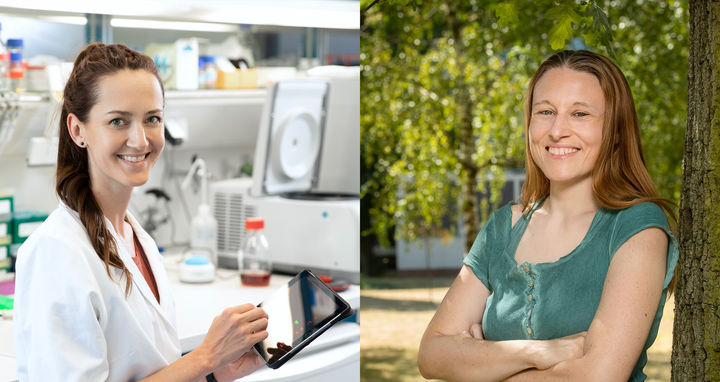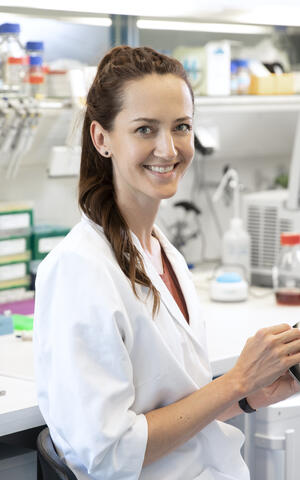ERC funding for pioneering research
Dr. Kathrin de la Rosa and Dr. Ilaria Piazza, who are both junior group leaders at the Max Delbrück Center for Molecular Medicine in the Helmholtz Association (MDC), have each won European Research Council (ERC) Starting Grants. The prestigious grants provide about €1.5 million over five years to early-career scientists and scholars to build their own teams and conduct “high risk, high reward” research. The researchers must have completed their Ph.D. within the last two to seven years and have a scientific track record showing great promise. This year, 436 European scientists from diverse research fields will receive the funding.
“The ERC Starting Grants tend to fund projects that would perhaps fail in other contexts, because the ideas are, to simply put it, too crazy,” says Piazza, who heads the Allosteric Proteomics Lab. De la Rosa, who heads the Immune Mechanisms and Human Antibodies Lab, agrees: “It enables us to address more risky hypotheses.”
Small interactions, big impact?
Ilaria Piazza
Piazza investigates the interactions between proteins and small molecules, which can be either natural metabolites, or manmade drugs. “We know quite a lot about how proteins interact with each other, or interact with nuclei acids like DNA or RNA, but exploring how they interact with metabolites or drugs on a global scale, that is new,” Piazza says.
She has developed an innovative approach to analyze these interactions: a combination of protease, a protein that chops up or “cleaves” proteins, and mass spectrometry, a machine that detects and reads all the different segments of proteins, called peptides. Piazza compares peptide chains of a protein exposed to a small molecule versus not exposed. If the chains are different, it indicates the protein was cut differently because it was bound to the small molecule.
The power of the approach is she can study thousands of proteins at the same time, to see which ones bind to a particular small molecule of interest. The “crazy” part of her hypothesis is that the interactions between proteins and small molecules that occur inside the cell nucleus can directly affect gene expression. She suspects these interactions – which reflect the influences of the outside world, versus predetermined genetics – hold the key to explaining why diseases develop.
“Why is it that twins, which have the same genetic code, can have different personalities and diseases?” Piazza asks. “How we live and the environment we live in affect how DNA is translated into proteins, and I believe the interactions between proteins and small molecules plays a huge role that is totally unexplored.”
It might be that the effect is much smaller than she suspects, but receiving the ERC Starting Grant is validation the idea is worth pursing, Piazza says. The grant of about €1.7 million for her project proteoRAGE will enable her to hire additional team members for her lab, which started earlier this year. “I need brave people who aren’t afraid to think out of the box,” she says
Exploiting nature’s successful tricks
Kathrin de la Rosa
Kathrin de la Rosa, who started her immunology research lab at MDC in 2018, could hardly believe she had won the grant. “But when congratulations came from others who helped me through the submission process, then I could celebrate,” she says. She was awarded about €1.5 million for her project AutoEngineering.
It is focused on tweaking the body’s own B cells in the laboratory so that they produce antibodies that are even more powerful than their natural counterparts. But de la Rosa will not use genetic scissors such as CRISPR-Cas9 to alter their DNA. “If these scissors cut in the wrong place, there can be unintended side effects. The cells can even turn cancerous,” she says. Instead, de la Rosa wants to harness the natural ability of B cells.
B cells are a type of white blood cell. They produce highly specialized antibodies that recognize and bind to intruders in the body. In this way, they attract defensive cells that destroy pathogens such as viruses, bacteria and parasites. When B cells encounter such pathogens, they get activated – they multiply and their DNA strands break especially often at sites where antibodies are encoded. This randomly modifies the antibodies, creating versions with a better fit. In rare cases during malaria infection, antibodies “steal” a segment of another gene: A whole new pathogen receptor is inserted that leads to broadly reactive antibodies. “Pathogens have a harder time escaping from these antibodies, even when the intruder mutates and changes its surface,” de la Rosa says.
De la Rosa wants to uncover the process of natural “segment stealing” step by step, which she and colleagues observed for the first time in 2016. Her lab will seek to understand the underlying mechanisms to induce the process in the petri dish. “First, we have to find efficient ways of exploiting this cell’s own mechanism, test whether it is safer than CRISPR-Cas9 and then use it to create new types of antibodies,” she says. “Just imagine if we could copy the most successful tricks from nature and thereby help the immune system keep pathogens such as HIV in check!” For her and her team it is very exciting to work on something that could one day be a completely new approach to vaccines. “It’s going to be an interesting journey,” de la Rosa says.
Text: Laura Petersen
Further information
- ERC Starting Grants 2020: €677 million awarded to unravel scientific mysteries (ERC press release)
- ERC Starting Grants 2020 – Zahlen und Fakten (engl.)
- Engineer of the immune system
- How metabolites and proteins shake hands
Pictures to download
Dr. Kathrin de la Rosa in her lab. Foto: Pablo Castagnola / MDC
Dr. Ilaria Piazza joined the MDC in 2020. Foto: David Ausserhofer/ MDC
Contact
Jana Schlütter
Editor, Communications Department
Max Delbrück Center for Molecular Medicine in the Helmholtz Association (MDC)
+49 (0)30 9406-2121
jana.schluetter@mdc-berlin.de oder presse@mdc-berlin.de
- The Max Delbrück Center for Molecular Medicine (MDC)
-
The Max Delbrück Center for Molecular Medicine in the Helmholtz Association (MDC) is one of the world’s leading biomedical research institutions. Max Delbrück, a Berlin native, was a Nobel laureate and one of the founders of molecular biology. At the MDC’s locations in Berlin-Buch and Mitte, researchers from some 60 countries analyze the human system – investigating the biological foundations of life from its most elementary building blocks to systems-wide mechanisms. By understanding what regulates or disrupts the dynamic equilibrium in a cell, an organ, or the entire body, we can prevent diseases, diagnose them earlier, and stop their progression with tailored therapies. Patients should benefit as soon as possible from basic research discoveries. The MDC therefore supports spin-off creation and participates in collaborative networks. It works in close partnership with Charité – Universitätsmedizin Berlin in the jointly run Experimental and Clinical Research Center (ECRC), the Berlin Institute of Health (BIH) at Charité, and the German Center for Cardiovascular Research (DZHK). Founded in 1992, the MDC today employs 1,600 people and is funded 90 percent by the German federal government and 10 percent by the State of Berlin.









